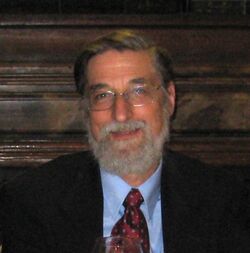Bertrand Halperin
Topic: Biography
 From HandWiki - Reading time: 2 min
From HandWiki - Reading time: 2 min
Bert Halperin | |
|---|---|
 | |
| Born | December 6, 1941 Brooklyn |
| Nationality | United States |
| Alma mater | Harvard University University of California, Berkeley |
| Known for | Hexatic phase Quantum Hall effect |
| Awards | Oliver E. Buckley Condensed Matter Prize (1982) Lars Onsager Prize (2001) Wolf Prize in Physics (2003) |
| Scientific career | |
| Fields | Physics |
| Institutions | Harvard University |
| Doctoral advisor | John J. Hopfield |
Bertrand I. Halperin (born December 6, 1941) is the Hollis Professor of Mathematics and Natural Philosophy at the physics department of Harvard University.
Halperin was born in Brooklyn, New York, where he grew up in the Crown Heights neighborhood. His mother was Eva Teplitzky Halperin and his father Morris Halperin. His mother was a college administrator and his father a customs inspector. Both his parents were born in USSR. His paternal grandmother's family the Maximovs claimed descent from Rabbi Israel Baal Shem Tov, the BESHT.
He attended Harvard University (class of 1961), and did his graduate work at Berkeley with John J. Hopfield (PhD 1965). In the 1970s, he, together with David R. Nelson, worked out a theory of two-dimensional melting, predicting the hexatic phase before it was experimentally observed by Pindak et al. In the 1980s, he made contributions to the theory of the Integral and Fractional Quantum Hall Effect. His recent interests lie in the area of strongly interacting low-dimensional electron systems. In 2001, he was awarded the Lars Onsager Prize. In 2003, he and Anthony J. Leggett were awarded the Wolf Prize in physics. In 2018, he was awarded the 2019 APS Medal for Exceptional Achievement in Research.
Selected bibliography
- Halperin, Bertrand I.; Anderson, Philip W.; Varma, Chandra M. (January 1972). "Anomalous low-temperature thermal properties of glasses and spin glasses". Philosophical Magazine (Taylor and Francis) 25 (1): 1–9. doi:10.1080/14786437208229210. Bibcode: 1972PMag...25....1A. https://dx.doi.org/10.1080/14786437208229210. Pdf.
References
External links
- Harvard University faculty page
- Wolf Prize page
- Bertrand Halperin at the Mathematics Genealogy Project
| Academic offices | ||
|---|---|---|
| Preceded by Andrew Gleason |
Hollis Chair of Mathematics and Natural Philosophy 1992–present |
Succeeded by current incumbent |
 KSF
KSF